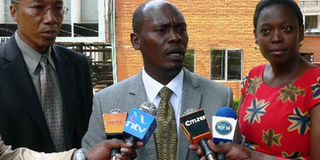Even death is taxable in county’s bizarre Bill

FILE | NATION
Governor William Kabogo (centre), his deputy, Gerald Githinji and Women representative Anna Nyokabi. Kiambu County has proposed to tax the dead.
What you need to know:
- To conduct burial on one’s soil, the bereaved will have to fork out Sh4,500 if the dead is an adult, Sh3,000 for a child and Sh2,500 for an infant.
Dying is going to become an extremely costly affair in Kiambu if the county forges ahead with plans in its Finance Bill, 2013.
In a move that the county government says is meant to raise revenue to fund its Sh12.6 billion budget, the region is also proposing to tax farmers before the carcasses of their livestock and pets can be collected for disposal.
To conduct burial on one’s soil, the bereaved will have to fork out Sh4,500 if the dead is an adult, Sh3,000 for a child and Sh2,500 for an infant.
Families whose relatives die and are buried in cemeteries within the county will pay Sh8,000 for a permanent grave while those whose loved ones die in other counties but are to be buried in Kiambu will pay Sh10,000. Non-residents of Kiambu will be charged Sh25,000.
Besides these charges, the families will be required to pay Sh30,000 every time maintenance work is undertaken on the graves in cemeteries.
Should a grave be reopened, say, in the event of a court order, families will pay Sh15,000 if the dead was an adult, Sh10,000 for a child and Sh5,000 for an infant.
Speaking in Githunguri earlier in the week, Kiambu Governor William Kabogo said the Bill would not be amended, but would be implemented as the executive had proposed.
Sigona ward representative Mutonya Njenga said it was inhumane to charge mourning families before allowing them to bury their loved ones.
Proposed burial fees
“I believe Kabogo is playing politics with the Bill because it is just a draft, which must go through amendments at the assembly whose mandate is legislation,” he said and proposed a zero charge for burials at home and Sh1,000 for burials at public cemeteries.
Mr Njenga said he had received numerous complaints from the residents about the Bill and especially the proposed burial fees.
The 70-page Bill was tabled before the County Assembly by the acting chairman of the Finance committee, Mr Lawrence Mwaura.
The revenue raised is expected to finance Kiambu’s Sh12.6 billion budget, which includes Sh100 million for the governor’s office, Sh155 million for the county assembly and Sh515 million for education and social services.
Some County Assembly representatives have already protested against some of the proposals in the Bill as have residents who have described the plans as draconian and insensitive.
Mr Lawrence Mwaura, who is the vice-chairman of the Kiambu County Assembly’s Finance Committee and the representative for Ting’ang’a yesterday said: “The Bill is just a wish list that is being subjected to different sectoral committees where changes are being made to create a win-win situation for the residents and the county leaders.”
Mr Mwaura urged other ward representatives to inform the public that the Bill was just a draft, and they have 19 calendar days to work on it and come up with a final copy that would be presented to the assembly.
Farmers have not been spared either as they will be charged Sh4,000 for every cow, pig, donkey or horse that dies on their land before the county government can collect the carcasses for disposal.
“I would rather dump my dead cow or donkey on the roadside in the night instead of parting with Sh4,000 per animal as collection fee,” Mr Benson Maina, a resident of Limuru sub-county in Kiambu, said.
Disposing the carcasses of chickens and cats will cost their owners Sh400 a-piece.
In an even more bizarre proposal, county government officials — to be known as ward administrators — will charge every household a fee for slaughtering livestock with chicken attracting the lowest levy (Sh20), a goat Sh150 and a cow Sh400.
This is the first time such a measure is being introduced. The county intends to hire 60 administrators to work in all the eight constituencies in the county.
Entertainment spots have not been left out either. Night clubs with the capacity to host more than 50 patrons will pay Sh50,000 for annual licenses while each butchery that also offers roast meat will be charged Sh7,000.
Pubs with traditional liquor and has seats that can host 16 to 50 patrons will pay Sh10,000 while video and cinema halls will be charged Sh25,000.
Business premises that put up Christmas decorations will pay an additional Sh2,000 to cover the duration of the festivities.
A business or any other organisation with a signboard showing directions to their premises will also be required to pay Sh5,000 for each sign per year.




